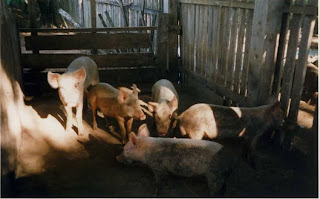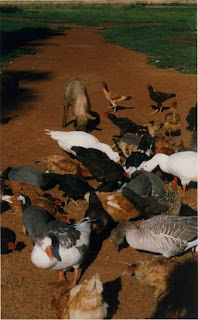_-_The_Olive_Trees_(1889).jpg) You can't make olive oil without olives and you can't get olives without olive trees and you can't have olive trees without land and you can't get abundant harvests of olives from these trees without the farmers who know and understand them and who have tended them over generations.
You can't make olive oil without olives and you can't get olives without olive trees and you can't have olive trees without land and you can't get abundant harvests of olives from these trees without the farmers who know and understand them and who have tended them over generations.The ruthless destruction of any tree fills me with anger and sadness but there is something about the deliberate savaging of olive trees in Palestine that amplifies my anger. I am especially affected by the irreversibility of the destruction: you have to wait 500 years to have more 500-year old olive trees.
 For me, olive trees are not only ancient but noble, patient, quiet and very beautiful, their colors harmonious with the dusty, muted terrain. I respect these trees because for sometimes hundreds of years they've been the primary livelihood for Palestinians.
For me, olive trees are not only ancient but noble, patient, quiet and very beautiful, their colors harmonious with the dusty, muted terrain. I respect these trees because for sometimes hundreds of years they've been the primary livelihood for Palestinians. The olive farmers of Palestine are by no means an agribusiness,
The olive farmers of Palestine are by no means an agribusiness,  consisting of small, family enterprises using farming practices and equipment that are not at all helpful in a global economy.
consisting of small, family enterprises using farming practices and equipment that are not at all helpful in a global economy.  Combined with the additional obstacles created by Israel's occupation, it is nothing short of miraculous that we have the privilege of buying and using Palestinian olive oil.
Combined with the additional obstacles created by Israel's occupation, it is nothing short of miraculous that we have the privilege of buying and using Palestinian olive oil.
Today, they are under terrible threat.
 The Israeli occupation of Palestine has created a cruel attack on the land, the cutting down of olive trees to build the enormous separation barrier, the annexation of agricultural land to build roads and the theft of land to build illegal settlements. Millions of olive trees have been uprooted while others have been separated from their farmers by the occupation's various pernicious tactics, including severely restricted access to the trees and to the harvesting of the olives.
The Israeli occupation of Palestine has created a cruel attack on the land, the cutting down of olive trees to build the enormous separation barrier, the annexation of agricultural land to build roads and the theft of land to build illegal settlements. Millions of olive trees have been uprooted while others have been separated from their farmers by the occupation's various pernicious tactics, including severely restricted access to the trees and to the harvesting of the olives. Farmers are prevented from tending their trees by a series of punitive rules that regulate the hours during which Israeli soldiers allow access through guarded gates and the issuance of permits to who will be allowed this access.
Farmers are prevented from tending their trees by a series of punitive rules that regulate the hours during which Israeli soldiers allow access through guarded gates and the issuance of permits to who will be allowed this access.  Uniformed soldiers are a threatening presence in the olive groves and heavy equipment a terrifying weapon that uproots, slashes and burns the trees.
Uniformed soldiers are a threatening presence in the olive groves and heavy equipment a terrifying weapon that uproots, slashes and burns the trees.It is estimated that as many as four million olive trees have been taken out of production, by one or other of these means.
These pictures tell the story.


 There is no need here for my explanatory words. I must however express the deep outrage I feel as a Jew that people of my 'tribe', a people for whom a belief in justice has always been fundamental, can destroy these ancient, beautiful living things and at the same time deprive another people of the right to their traditional livelihood.
There is no need here for my explanatory words. I must however express the deep outrage I feel as a Jew that people of my 'tribe', a people for whom a belief in justice has always been fundamental, can destroy these ancient, beautiful living things and at the same time deprive another people of the right to their traditional livelihood.

When we buy olive oil from Spain or Italy or Greece, we don't think much about the journey from the olive tree to the bottle on our kitchen counter.
And when we think about olives we probably don't think about Palestine and many of us don't even know that we can buy Palestinian olive oil in North America. And even if we know all that, we may not realize the many, many obstacles that stand between those Palestinian olive trees and the Palestinian olive oil that is available to us in this country. I owe my first bottle of this excellent olive oil to Zatoun, (zatoun means olive in Arabic), a grass roots organization in Toronto and its founder Robert Massoud. Please listen to his story on Tidings from Hazel Kahan and visit the Zatoun website to place your order. The olive oil is also available from the American Friends Service Committee.
 Even if you are at war with a city...you must not destroy its trees for the tree of the fields is man's life. Deut.20:19-20
Even if you are at war with a city...you must not destroy its trees for the tree of the fields is man's life. Deut.20:19-20 Related sites:
















